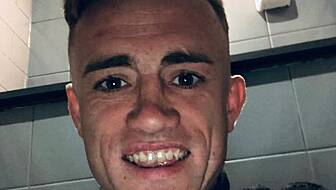A jury will begin their deliberations in the trial of a man who stabbed his housemate to death.
Although the prosecution argues he should be found not guilty of murder by reason of insanity, the defence "is in the usual position" of arguing he has "some criminal responsibility" and should be found guilty of manslaughter.
"You would expect it to be reversed; for the defence to be saying there is no liability and the prosecution saying there is," counsel for the defendant told the jury on Tuesday.
Tony McGillicuddy SC, for the Director of Public Prosecutions, told the jury of six men and six women that two eminent consultant psychiatrists had told them that Sean Murphy was suffering from a severe mental disorder when he stabbed Michael Olohan to death.
He said the doctors had differed only on how severely the mental disorder was damaging or impacting Mr Murphy's mental health.
One, counsel said, had stated that the accused was psychotic and unable to resist killing Mr Olohan, while the other said Mr Murphy could have resisted, although his capacity was substantially diminished.
If the jury accepts, on the balance of probabilities, that Mr Murphy was psychotic and unable to resist, the correct verdict is not guilty by reason of insanity, Mr McGillicuddy said.
If they find it is more likely that Mr Murphy could have resisted, but his responsibility was substantially diminished by his mental illness, the correct verdict is manslaughter due to diminished responsibility.
Counsel said it is a difficult and sad case, but he urged the jury to "approach it in a sober and clinical manner" and, having reviewed the evidence, to come to the appropriate conclusions.
Psychiatric evidence
Defence counsel Michael O'Higgins SC said that a finding of guilty of murder would be "perverse" given the psychiatric evidence.
He said the defence is in the "unusual" position in that it is saying Mr Murphy has "some criminal responsibility" and should be found guilty of manslaughter, while the prosecution is arguing for a not guilty by reason of insanity verdict.
He suggested that the jury should favour the manslaughter verdict and asked the members to give their deliberations "the very clear attention you have already given from the moment you sat down".
Mr Murphy (29), with an address at Bradóg Court, St Lawrence Road, Clontarf, Dublin 3, has pleaded not guilty to the murder of Michael Olohan (35) at the apartment they shared on St Lawrence Road on August 13th, 2020.
Mr Olohan is originally from Poppintree in Ballymun, north Dublin.
The jury has been told that at the time of the stabbing, the accused and deceased lived together at Bradóg Court in a "step-down independent living facility" run by St Vincent's Hospital Psychiatric Services.
Ronan Kennedy SC, for the prosecution, told the jury in his opening speech that Mr Olohan had lived there for some years, while Mr Murphy moved in four months previously, having been discharged from the psychiatric ward of St Vincent's Hospital.
On Tuesday, Mr McGillicuddy reminded the jury of the evidence of State Pathologist Dr Heidi Okkers, who identified three stab wounds to Mr Olohan's chest, one of which penetrated the right lung, causing severe bleeding and a loss of blood pressure that caused his death.
Within minutes of the stabbing, Mr Murphy arrived at Clontarf Garda station in a blood-stained t-shirt and wearing no shoes.
He told gardaí he had stabbed someone, saying: "I just got these sick thoughts, I used a knife, I'm really sick."
He explained that he gets ideas where he believes he has to do certain things or "bad things will happen". He later said: "I got a bad thought, I had to attack Michael with the knife even though I didn't want to."
Mental disorder
Mr McGillicuddy told the jury that two psychiatrists who gave evidence in the trial agreed that Mr Murphy was diagnosed with obsessive compulsive disorder (OCD) as a teenager.
They agreed that OCD is a mental disorder and at the time of the stabbing it was "affecting his mental reasoning, thinking and mental health in a very substantial and severe way".
Both described the symptoms of OCD by explaining that sufferers develop obsessions which cause them to feel compelled to act in particular ways. In Mr Murphy's case, the accused believed that he had to kill someone to prevent himself from going to hell for eternity.
Counsel said that Dr Ronan Mullaney, who was called by the prosecution, said Mr Murphy's OCD was accompanied by psychotic symptoms which caused him to be unable to resist killing Mr Olohan.
Dr Mullaney's evidence was that Mr Murphy should be found not guilty by reason of insanity.
Professor Keith Rix disagreed with Dr Mullaney on how severely the mental disorder was damaging or impacting Mr Murphy's mental health at the time, Mr McGillicuddy said.
The professor did not believe Mr Murphy was psychotic and said that he was able to resist the killing. However, Professor Rix found that Mr Murphy's responsibility was substantially diminished by OCD, and he should therefore be found not guilty of murder but guilty of manslaughter.
Mr McGillicuddy suggested that the jury should "prefer the evidence of Dr Mullaney". He said Dr Mullaney had carried out "a more complete evaluation of the circumstances.
"He had all the relevant paperwork, he reviewed those things and set out his opinion to you and properly supported it at each limb along the way," counsel added.
The conclusions of Professor Rix, Mr McGillicuddy said, "are not as sturdy or to be accepted over those of Dr Mullaney, because he didn't have sight of all the materials and accepted that would weaken the strength of his opinion".
Mr McGillicuddy said the professor had acknowledged that having seen Dr Mullaney's report, "his opinion that he had expressed initially was weakened".
Mr McGillicuddy suggested that the proper verdict is one of not guilty by reason of insanity.
Criminal responsibility
Michael O'Higgins SC, for Mr Murphy, told the jury that this case is "unusual" in that the prosecution is arguing for a not guilty by reason of insanity verdict while "the defence is saying there is some criminal responsibility attaching to his actions".
"You would expect it to be reversed, for the defence to be saying there is no liability and the prosecution saying there is," counsel added.
He said that there is "not much between the two doctors" and both the prosecution and defence agree that Mr Murphy was suffering from a severe mental illness. The "fine distinction" relates to whether there is no responsibility, as Dr Mullaney said, or "marginal responsibility" as Professor Rix suggested.
Counsel suggested that Professor Rix is more likely to be correct.
He said Mr Olohan's death was "horrible" and he bears no responsibility for what happened to him. But for the actions of Mr Murphy, he would have got up that morning and had an "otherwise unremarkable day".
The evidence in the trial was focussed on the accused and not the deceased, which counsel said may seem strange but "it is the accused who is on trial, not the victim, so the spotlight is on him".
He said there are "theoretically" four verdicts available but that an outright finding of not guilty or of guilty of murder would be "perverse".
The choice, he said, is in the "middle ground" between not guilty by reason of insanity or not guilty of murder but guilty of manslaughter due to diminished responsibility.
He said: "What it comes down to is this, in electing as to which course you go, you look at Professor Rix, who says he was in a very bad way, very ill, but still had some responsibility for what he did because he could have resisted but didn't.
"Dr Mullaney says no, that ship has sailed, the level of illness mixed in with psychosis meant the choice was gone and he acted on an impulse that for him was irresistible. That seems to be the kernel of the case."
A jury would need "a very, very good reason" to disregard the expert evidence, Mr O'Higgins said, adding that there is "no good reason to discount" that Mr Murphy has a long history of mental illness requiring numerous hospital admissions going back many years.
At the time of the stabbing, Mr Murphy was suffering "an extreme episode of mental illness" and evidence in that regard was given by Dr Mullaney and Professor Rix and was supported by a third consultant psychiatrist who diagnosed Mr Murphy with OCD at Clontarf Garda Station on the day of the stabbing.
There was further evidence in the trial of a similar diagnosis being reached by psychiatrists throughout Mr Murphy's life and during his time in custody and in the Central Mental Hospital.
Both doctors are "exceptionally well qualified and experienced in their field," Mr O'Higgins said, and were able to make "sensible and compelling observations arising from the diagnosis".
He said there is one difference between them, and suggested that Professor Rix's version is "more likely" to be correct.
Ms Justice Mary Ellen Ring told the jury that their verdict must be unanimous and should be reached in accordance with the oath or affirmation taken at the start of the trial.
She told them to discuss the case, argue and persuade if they have a particular point of view.
"That is what juries do," she said. "But what you should never do is pressurise someone. It is important that you not be pressurised into reaching a verdict with which you do not agree."
The jury will return on Wednesday to begin their deliberations.







